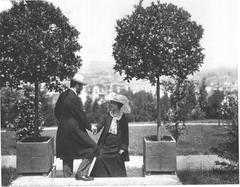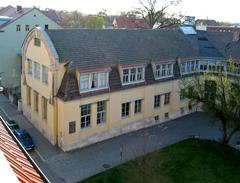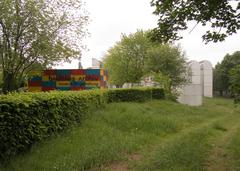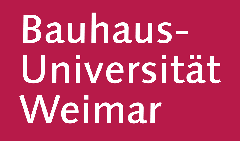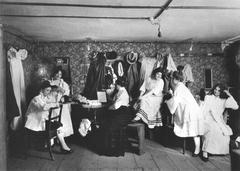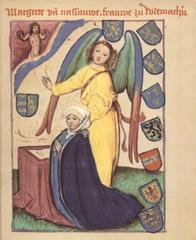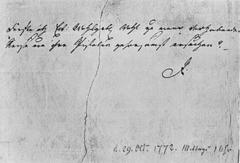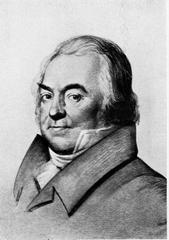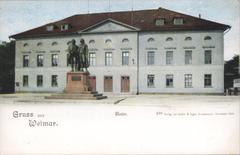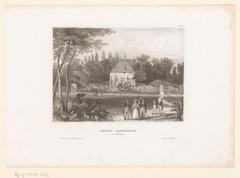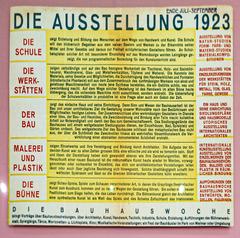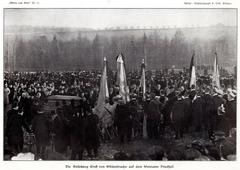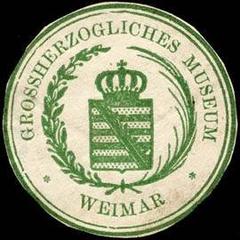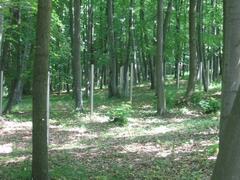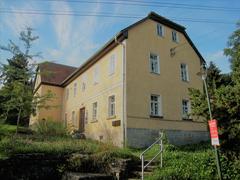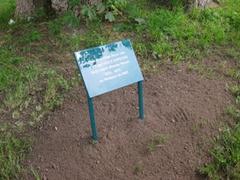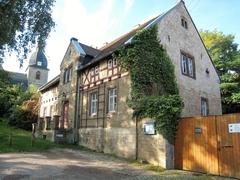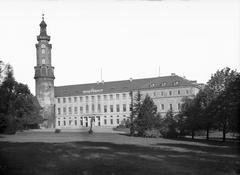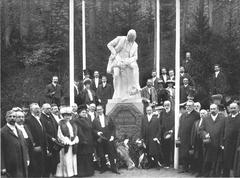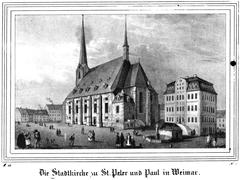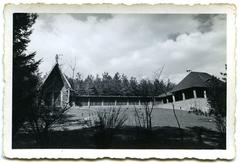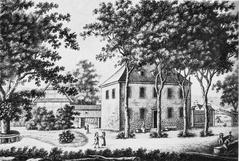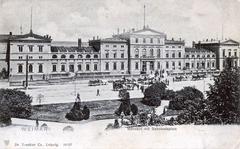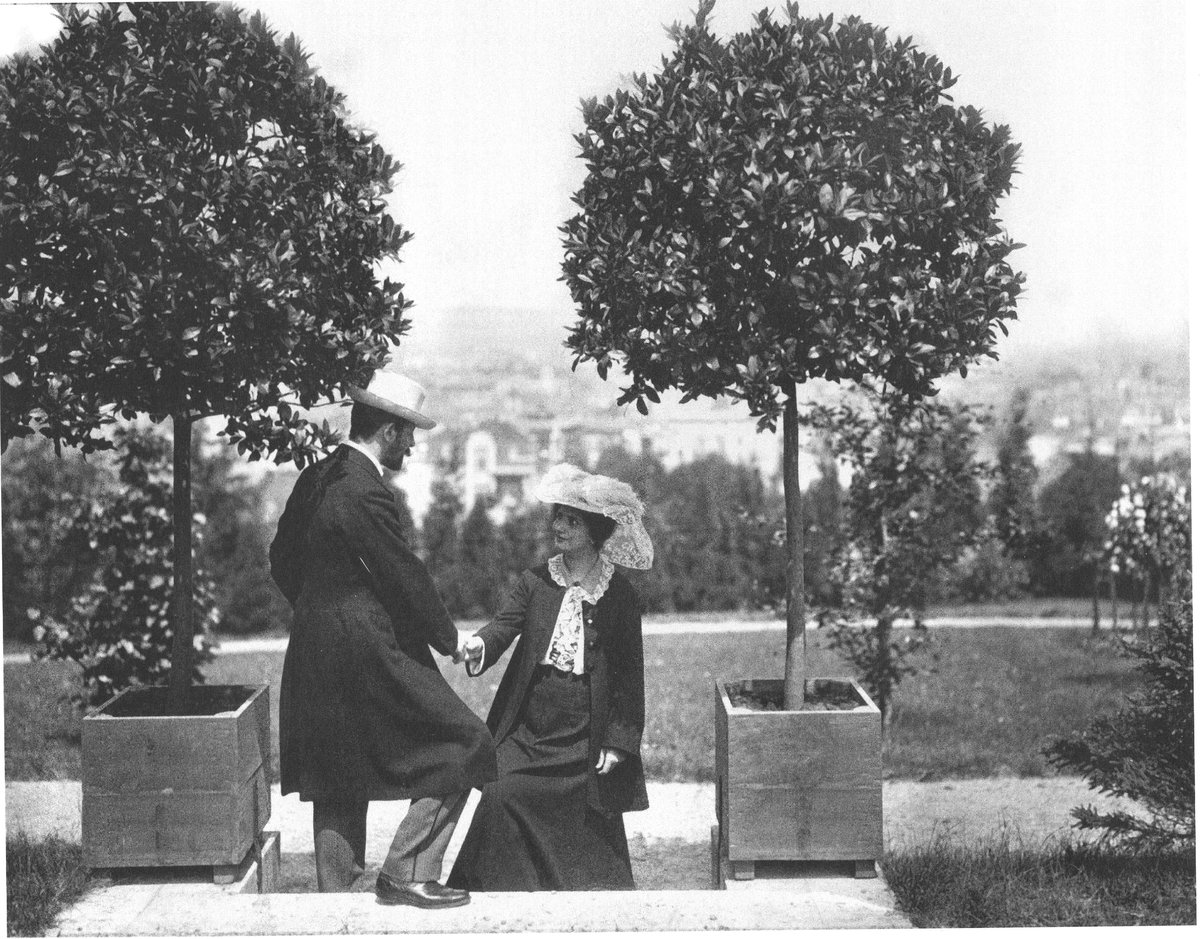
Nietzsche-Archiv Weimar: Visiting Hours, Tickets, and Historical Significance
Date: 14/06/2025
Introduction
The Nietzsche-Archiv, located in Weimar, Germany, stands as a testament to the life and legacy of Friedrich Nietzsche, one of the most influential philosophers of the modern era. Housed in the historic Villa Silberblick, the archive offers visitors an in-depth exploration of Nietzsche’s work, philosophy, and the turbulent history that shaped his posthumous reputation. This guide provides detailed information on visiting hours, ticketing, accessibility, historical context, and ways to enhance your experience at this unique cultural landmark.
For up-to-date details, consult the official Klassik Stiftung Weimar website and reputable sources like Wikipedia and Philosophy Now.
Table of Contents
- Introduction
- Historical Background
- Visitor Information
- Visitor Experience Highlights
- Multimedia Guides
- Frequently Asked Questions (FAQ)
- Visitor Tips
- Conclusion
- References
Historical Background
Founding and Early Years
The Nietzsche-Archiv was founded in 1894 by Elisabeth Förster-Nietzsche, Nietzsche’s sister, with the initial aim of collecting and preserving all documents, manuscripts, and personal effects related to Nietzsche. Originally established in Naumburg, the archive relocated to Weimar in 1896, settling in Villa Silberblick in 1897. The villa became both Elisabeth’s home and Nietzsche’s final residence, with the philosopher passing away there in 1900 (Wikipedia; Klassik Stiftung Weimar).
Architectural Transformation
In 1902, at the behest of Harry Graf Kessler, Belgian architect Henry van de Velde redesigned significant portions of the villa, including the entrance, library, and assembly rooms. This transformation endowed the villa with distinct Art Nouveau features, creating a harmonious Gesamtkunstwerk—a total work of art that remains a highlight of the archive today (Klassik Stiftung Weimar).
Shaping Nietzsche’s Reception
From its inception, the archive played an influential role in shaping the worldwide perception of Nietzsche. Elisabeth Förster-Nietzsche actively acquired and edited Nietzsche’s works, occasionally manipulating texts to fit specific ideological narratives. This editorial control has been a point of controversy, affecting Nietzsche’s posthumous image for decades (Wikipedia).
The Archive in the Nazi Era
During the Nazi period, Nietzsche’s philosophy was appropriated by Nazi ideologues, despite Nietzsche’s explicit rejection of anti-Semitism and nationalism. Adolf Hitler visited the archive and attended Elisabeth Förster-Nietzsche’s funeral in 1935. Recent exhibitions, such as “Nietzsche im Nationalsozialismus,” have critically examined the archive’s role in this period and challenged the misrepresentation of Nietzsche’s thought (Philosophy Now; MDR Kultur).
Postwar and GDR Period
After World War II, the archive was absorbed into the East German cultural heritage system and formally dissolved in 1956. Access to Nietzsche’s works was restricted in the GDR, but Western scholars like Mazzino Montinari were instrumental in producing critical editions that restored Nietzsche’s original texts (Wikipedia).
Reunification and Modern Role
Following German reunification, the archive’s collections became part of the Klassik Stiftung Weimar. Villa Silberblick now functions as both a museum and a research center. The archive’s holdings are included in UNESCO’s “Memory of the World” program, underscoring their international significance (Klassik Stiftung Weimar).
Collections and Legacy
The Nietzsche-Archiv houses original manuscripts, letters, personal effects, and unique period furnishings. Highlights include Nietzsche’s study, the Max Klinger bust, and the van de Velde-designed library. The archive balances its role as a scholarly resource with its mission to engage the public in Nietzsche’s enduring intellectual legacy.
Visitor Information
Location
Address: Humboldtstraße 36, 99425 Weimar, Germany.
Located in Villa Silberblick, the archive is within walking distance of Weimar’s city center and other major cultural sites (Klassik Stiftung Weimar).
Visiting Hours
- Summer (March 21 – November 1): Wednesday to Monday, 10:00–18:00 (closed Tuesdays).
- Winter: Generally closed; check the official website for updates and special openings.
- Public Holidays: Usually open, but research facilities may be closed.
Tickets and Admission
- Adults: €5.00–€8.00 (depending on exhibition)
- Reduced (students, seniors, disabled): €4.00–€5.00
- Pupils (16–20): €2.00
- Children under 16: Free
- Free entry with the WeimarCard (Weimar Card)
- Family ticket: €16 (where available; check current offers)
- Group tours: Available by request
Tickets can be purchased on-site or online via the Klassik Stiftung Weimar ticket portal.
Accessibility
Villa Silberblick is a historic building, and while the main exhibition spaces are on the ground floor and wheelchair accessible, some areas may present challenges. Visitors with mobility needs are encouraged to contact the archive ahead of time for assistance and up-to-date information. Accessible restrooms and cloakrooms are available (Klassik Stiftung Weimar).
Guided Tours and Special Events
Guided tours are available for groups by prior arrangement and are offered in German and English. Thematic tours—such as “Nietzsche and Weimar” or explorations of the archive’s role in 20th-century intellectual history—are frequently scheduled. The archive also hosts lectures, workshops, and annual events, particularly during Weimar’s Summer of Culture (Klassik Stiftung Weimar events).
Nearby Attractions
Visitors can enrich their experience by exploring other Weimar historical sites within walking distance:
- Goethe National Museum
- Bauhaus Museum
- Herzogin Anna Amalia Bibliothek
- Goethe- und Schiller-Archiv
- Weimarhaus
Visitor Experience Highlights
- Nietzsche’s Study and Private Rooms: Preserved with original furnishings and personal effects.
- Library and Lecture Room: Features rare manuscripts, early editions, and the Max Klinger bust.
- Art Nouveau Interiors: Designed by Henry van de Velde, offering unique photo opportunities.
- Permanent Exhibition “Kampf um Nietzsche”: Examines Nietzsche’s philosophy, his sister’s influence, and the archive’s historical role (Klassik Stiftung Weimar).
- Historic Garden: Tranquil spot for reflection, especially in spring.
Multimedia Guides
Rather than traditional exhibition texts, visitors are encouraged to use the Weimar+ App or the Audiala app. These multimedia guides provide audio-visual content, interactive maps, and thematic tours in several languages. Free Wi-Fi is available for downloads on-site (Klassik Stiftung Weimar).
Frequently Asked Questions (FAQ)
Q: What are the visiting hours?
A: Typically Wednesday to Monday, 10:00–18:00 (closed Tuesdays and in winter). Check the official website for seasonal changes.
Q: How much are tickets?
A: €5–€8 for adults, with reductions for eligible visitors. Children under 16 enter free.
Q: Is the Nietzsche-Archiv wheelchair accessible?
A: Main areas are accessible; some historic spaces may be limited. Contact ahead for details.
Q: Are guided tours available?
A: Yes, for groups and during special events, in German and English. Advance booking recommended.
Q: Can I take photos?
A: Personal photography is allowed without flash or tripods. Professional photography requires permission.
Q: Is there a café?
A: No, but Weimar’s city center has many dining options nearby.
Visitor Tips
- Book tickets and tours in advance, especially May–September.
- Download the Weimar+ or Audiala app before your visit.
- Check current opening hours and events online.
- Respect the villa’s ambiance; maintain quiet, especially around manuscripts.
- Combine your visit with other Weimar sites for a comprehensive experience.
Conclusion
A visit to the Nietzsche-Archiv in Weimar offers a rare opportunity to engage with the life, thought, and legacy of Friedrich Nietzsche within the authentic setting of his final home. The institution’s unique blend of historical preservation, scholarly depth, and innovative multimedia resources makes it an essential destination for philosophy enthusiasts, cultural travelers, and anyone interested in German intellectual history.
Plan your visit by checking the latest information on the official website, booking your tickets in advance, and downloading recommended audio guide apps. Explore further by visiting related sites in Weimar for a holistic cultural experience.
References
- Nietzsche Archive, Wikipedia
- Nietzsche-Archiv, Klassik Stiftung Weimar
- Nietzsche and Germany, Philosophy Now
- Nietzsche im Nationalsozialismus, MDR Kultur
- Visiting Nietzsche-Archiv, Weimar Tourist
- Klassik Stiftung Weimar Ticket Portal
